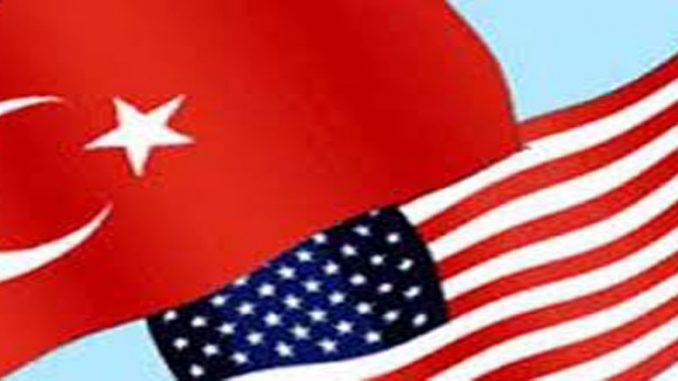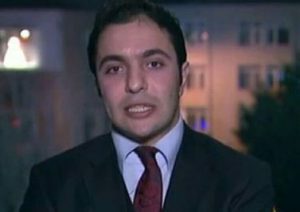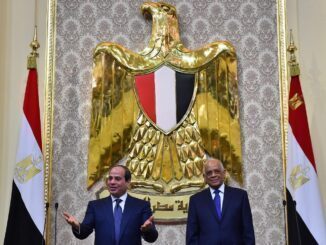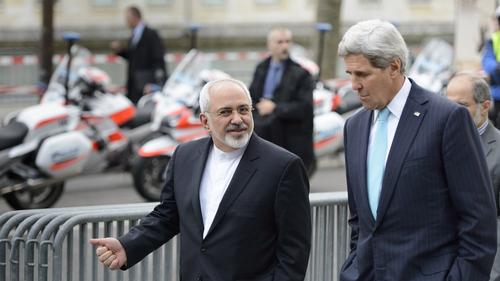
 BY: Cahit Tuz*
BY: Cahit Tuz*
Obama’s presidential election was welcomed in Turkey as well as in many Islamic countries. This positive welcome is not just about his second name being Hussein. The emphasis of withdrawal of US troops from Afghanistan and Iraq in Obama’s election campaigns had been instrumental in raising hope for regional peace. Another factor for the joyful welcome was that an African American individual became the president in the United States where African Americans were oppressed and exiled for a long time. However, if we were to express Obama’s two-term presidency regarding the Middle East and Turkey with one single statement, we can say that it has resulted in a complete disappointment.
Despite Obama’s eight-year rule, not only the withdrawal of US troops from Afghanistan and Iraq did not happen, but also the crises in these two countries have deepened. While Iraq is struggling with ISIS terrorism on one side, on the other side it has become the arena of sectarian quarrels, and today it is on the verge of being divided. The inconsistent policies that the Obama administration followed in Syrian politics and the understanding of politics far from reality led to an increase of chaos in the whole Middle East. At the same time, this understanding of politics gave almost courage to other terrorist organizations, and primarily ISIS. As a matter of fact, Obama was able to let Iran and Assad destroy the peaceful revolution in Syria by force, and then the country was dragged into chaos. This deadly mistake of Obama created a bigger gap for terrorist groups to be organized on the Iraq-Syrian border. Again, the fact that the US contacted Iranian supporter Husi’s in Yemen, has given Husi’s a power to invade Sana’a and overthrow the government. In Libya, Obama continued to have elbow contact with Califa Hafter, who attempted to organize a coup and went into civil war in his country.
Despite all the warnings of Turkey, the US took steps to encourage terrorist organizations in the region. The policies of the US that brought chaos caused serious problems in the relations with Turkey, which is its biggest ally in the region. When this was the case, Turkey was forced to act together with Russia for the solution of its problems. As a matter of fact, this gave results, and the negotiations in Astana where the parties in Syria came together for the first time at the same table are very important in this context. No matter how Obama administration is evaluated, it will be referred to as a period in which fatal mistakes are made for both the Middle East and Turkey, where there is discord and action imbalance, and a great disappointment occurs.
TRUMP ERA: IS USA RETURNING TO ITS ROOTS?
Trump took over a wreck left by Obama’s foreign policy. But there is also no signal that Trump will implement policies that will correct this wreck that is left by Obama. Trump’s alienating narrative used in his election campaigns, and the effort to turn this discourse into practice as soon as he came into office demonstrates that the US will have serious difficulties, especially in the Islamic world, during the Trump era. Trump literally reveals a classical republican reflex that does not care about the thought of the other nations and countries, and even sometimes disdains them. This may increase American antagonism, which has reached a peak in the early
years of the new century, and unhealthy relations with the rest of the world can create much more permanent and intense tremors than the those following the Vietnam War in the US if restorative policies are not implemented.
Especially Trump’s decision to ban visas for the seven Muslim majority countries led to considerable debate on the country’s inability to comply with its democratic values and founding philosophy. The use of the words “Islam” and “terror” together in the expression of “radical Islamic terrorism”, which Trump used in his inauguration ceremony, gives important clues about the new period in the USA. The discriminating language Trump used during the election campaigns, and the steps taken in this direction as soon as he took office, placed principles that constitute the founding philosophy of the United States at the center of debate. In fact, when we look at US history, it can be said that this discrimination against Muslims is not a new situation in the country. As a matter of fact, when the nearly 250 years of US history is subjected to investigation, it can be seen that many policies targeting Islam and immigrants have been implemented.
In the history of United States, there are many illegal acts against foreigners. In 1888, President Gorever Cleveland again blocked the entry into the United States of those who lived in America but temporarily returned to China, by signing the “Scott Act”, citing the “social cohesion problem” and “economic problems in the United States”. With the Scott Act, approximately 20 thousand Chinese people were victimized. It is possible to provide many examples, the chief of which are; the pressures on the Japanese living in America after the attack on the US port of Pearl Harbor in 1942 by the Japanese, and the recording of all Iranian students on the grounds that the Iranians who support the Revolution could enter the United States after the “Islamic Revolution” in 1979, the reduction of their duration of visas to one year, and interviewing the students every year to decide on the continuation or cancellation of their visas, the application launched by Bush after September 11, under the name of “National Security Ingress and Disclosure Registration System”, after which the entries and exits made to and from the USA from 25 different Muslim countries began to be recorded.
Trump’s rhetoric about immigrants as well as his attitude towards the Islamic world brought these unlawful practices in the history of the United States back to our minds. This naturally brought to mind the question, is USA returning to its roots. In particular, the use of Islam and terrorism together, his claim of moving the US embassy to Jerusalem, and the visa ban imposed on seven Islamic countries led to serious reactions among the people in the Islamic world. In addition, many of the names on Trump’s core team stand out with their anti-Islamic past, and appointing his son-in-law Jared Kushner, who is a Jew, for Middle Eastern politics, points out that relations with the Islamic world will be troubled.
The fact that Trump’s rhetoric often accentuates the former strong America, his signs that he will use the economy as a blunt instrument, his emphasis on rigid security tools, and his desire to increase the defense industry, also provide important evidence that the entire world will face serious trials in the Trump era. Up to this point, most of the things are at a rhetorical level. However, if these practices are attempted to be performed as they are rhetorically, they will
bring serious problems. As a matter of fact, Trump seems to have taken national and global institutional systems on by his discourse and actions during his election campaign and in the first days of his presidency.
THE EFFECT OF TRUMP ERA ON THE REGION AND POLITICS OF TURKEY
Just like in Middle East, Obama administration left important crises in Ankara-Washington relations. I think the most important reason for this is that the Obama administration was not trying to act according to the realities of the region, but instead tried to impose its realities on the region. This is in principle a policy conception that particularly the United States, and in general the Western world, applies in the region. However, we observed that this was applied more obviously during the Obama period. Compared to former US presidents, Obama became more involved in Middle East politics. But when compared to its predecessors, this situation only took place in a different direction. Obama’s understanding of politics that he sustained over proxies opened up space for terrorist organizations, such as the ISIS, that have become a global threat. As a matter of fact, Trump claimed that ISIS was founded by Obama and Clinton in front of the media, and said: “Yes, he is the founder. Obama found ISIS. And the deceitful Hillary Clinton is also an associate founder.”
United States with Trump as the president is still an unknown factor. Therefore, many countries in the region, especially Turkey, are waiting to see in what directions the steps taken by Trump will be in the Middle East. In this context, we have to point out two things. First, it is possible to conclude that President Trump is expected by states of the region to make a rapid and effective entry into the Middle East with the Syrian issue. Although Trump’s explanations for Iran, and using expressions for Syria that are close to the thesis of Turkey provide important clues, it is a matter of curiosity as to whether or not these practices shall be transformed into action. The second is Trump’s general attitude towards the Islamic world. Although Trump has not given positive signals in this regard yet, I think that he is aware that it is not wise to take the Muslims who make up one third of the world’s population against him.
Some of the evaluations, in particular those of the Muslim Brotherhood that is organized in 20 countries, to be announced as a terrorist organization by the new administration of the United States will have significant effects on relations between the US-Islamic world. This situation, which will not be accepted by any Muslim individual and government except those like the coup d’état Sisi, will bring serious inquiries towards the USA. Indeed, The Politico, which shared a summary of CIA officials ‘Ihvan’ report, points out that the CIA has made a warning that such a step would provide fuel to anti-Americanism in the region and significantly affect relations with its allies. Such a decision to be made against the Muslim Brotherhood who did not resort to any kind of violence in spite of all the pressure since its establishment is not only against US interests, but will also bring serious fractions. Anger against the US, which already has a very bad image in the Islamic world anyway, will have reached unseen levels.
If we evaluate the situation for Turkey, Obama has handed down two important issues in Turkey-US relations. The first is the clear support of the US for the terrorist organizations PYD and YPG that operate in Northern Syria. The second is that a terrorist organization attempting coup d’état in Turkey is residing in the United States, and that despite all the evidence provided by Turkey, no steps are taken. These two cases have questioned the alliance of Turkey with the
US. Today, the image of the US in the eyes of Turkish people is the image of a state acting as a patron of terrorist organizations. Again, the majority of Turkish people see the United States as the cause of the Syrian crisis to reach such bad results.
How Trump will act on these two issues remains uncertain, as it is in many files. However, if the situation continues or the uncertainty lengthens, Turkey will move more with Russia and the situation will bring more tensions in the Ankara-Washington line. If Trump maintains his position on Islam and therefore on Muslims, it can even bring bilateral relations to the breaking point. Hence, the harmony of Turkey, which has struggled to establish a new regional order partly due to Syria, established in this new period especially in relation to the US, will lead to outcomes for not only the relations of the two countries, but also for the region.
Undoubtedly Turkey’s role as the “responsible actor” in the Syrian crisis, the accelerating relations with Russia after the normalization, and its position as a “play maker” in the region will broaden the scope of Turkey’s influence. Successful results, especially achieved in the struggle against international terrorism, will provide important advantages to Turkey. It should also be emphasized that the “yes” outcome of the referendum on 16 April shall mean that Turkey’s role as the new responsible actor will have global outcomes as well as regional outcomes. Therefore, it is possible to say that the steps taken by the new US administration will lead to milestone developments in relations between USA-Middle East and USA-Turkey.
*Cahit Tuz is a Middle East expert. He wrote this article exclusively for the Middle East Observer on Saturday, Feb. 18, 2017.



